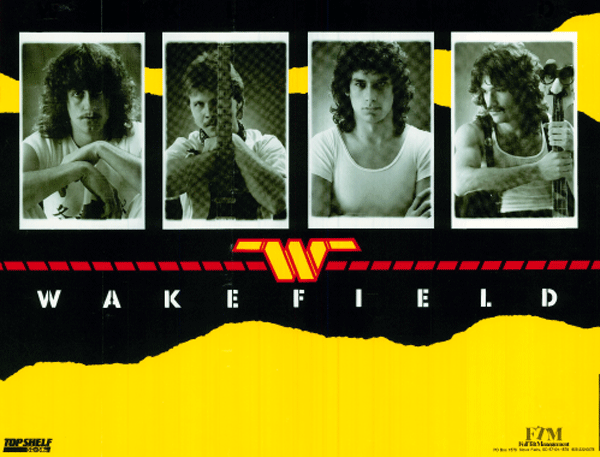 Wakefield
WakefieldIn 1973, ninth-grader Evan Jones decided to start a band. A Sioux Falls Axtell Park Junior High classmate gave him the phone number of guitarist Geoff Gunderson, an eighth-grader, and the two strangers became instant friends. They and some older kids formed a band called Shadowfax. But after a year or so, Geoff and Evan decided they wanted to be with kids their own age, so they left to form a new band.
Young drummer Jeff Koller’s previous band had dissolved, so when he got a call from Evan and Geoff, he was interested. These three would stay together playing music for the next 13 years! They needed a bass player, so the called on Danny Paul, who made up the final member of the new quartet.
When rehearsals began, the four decided their music would be original or obscure enough that only other musicians would recognize the songs. And they needed a name, so everyone was to come to practice one day with a list of possibilities. Among the offerings were Electric Funeral and Fawn, but the teens couldn’t agree. So they chose the most neutral name on the list, Wakefield, which was taken from a story about a European manor. It made the guys think of castles, which became the band's insignia for the next eight years.
Wakefield began touring that year, but the members faced the same issue as many young rock bands: their age. Evan was 15 and the others were 14, 14, and 13. People were amazed at their talent, but none of them could drive, let alone get into clubs to play gigs. So Evan's father, Rollie, became Wakefield’s manager and chauffeur, driving the bus from town to town. He had local authorities monitor the kids while they played in the clubs, which allowed them to perform years before they would otherwise be allowed by law. In another three years, Evan was old enough to drive the bus.
In 1977, the guys played several outdoor summer concerts at Great Bear, a ski area east of Sioux Falls. One was a battle of the bands, and Wakefield won free studio recording time. The result was the band’s first and only 45-rpm release, "Wonderstar," written by Evan, and "Here I Am," written by Geoff.
Wakefield had several bass player changes when Danny left the band. Former Starchild member Chuck Salisbury, and Pat O'Dea, another local bass player, filled the opening. Al Hanson, Starchild's lead vocalist, played with Wakefield for a short time. Eventually Chuck filled the bass player slot for several years to come.
Until 1981, the band played only on weekends. The exception was at the local Main Gate club, where they played five nights a week for three months in a row. This became Wakefield’s testing ground for new original material and for stage antics intended to keep the band fresh for what seemed to be the same audience night after night.
After Evan graduated from college in 1981, the road became fair game. Wakefield began touring a 10-state region, playing venues from Canada to Kansas, and Colorado to Illinois. The band played as many as 267 dates in a single year. During this time, Leroy Hedges from Aberdeen became the second and last lead singer to join the band. When Chuck decided to leave, Leroy also left. Wakefield was again without a bass player, and Rapid City native Dave Horan won the job. This was Wakefield’s last personnel change.
The band had always played the music they wanted to rather than what audiences wanted to hear. So they started mixing popular music with their new originals, and it worked. Wakefield’s popularity soared, and the band began backing up national acts such as ZZ Top and Head East. The band decided to record, and the result was the Wakefield album, which got air play on various Midwest radio stations.
The band always wanted a major label recording contract, but being from South Dakota didn't help because of the region’s relatively small population base. Also, all the members had families, and moving to a larger market was not a pleasant option. Wakefield did land a deal to distribute its album nationally, but the drawback was the need to tour nationally to support it. That would mean months away from families, so in 1987, Wakefield dissolved at the height of its popularity.
The South Dakota Rock and Roll Music Association is proud to welcome Wakefield into its hall of fame.
Awards